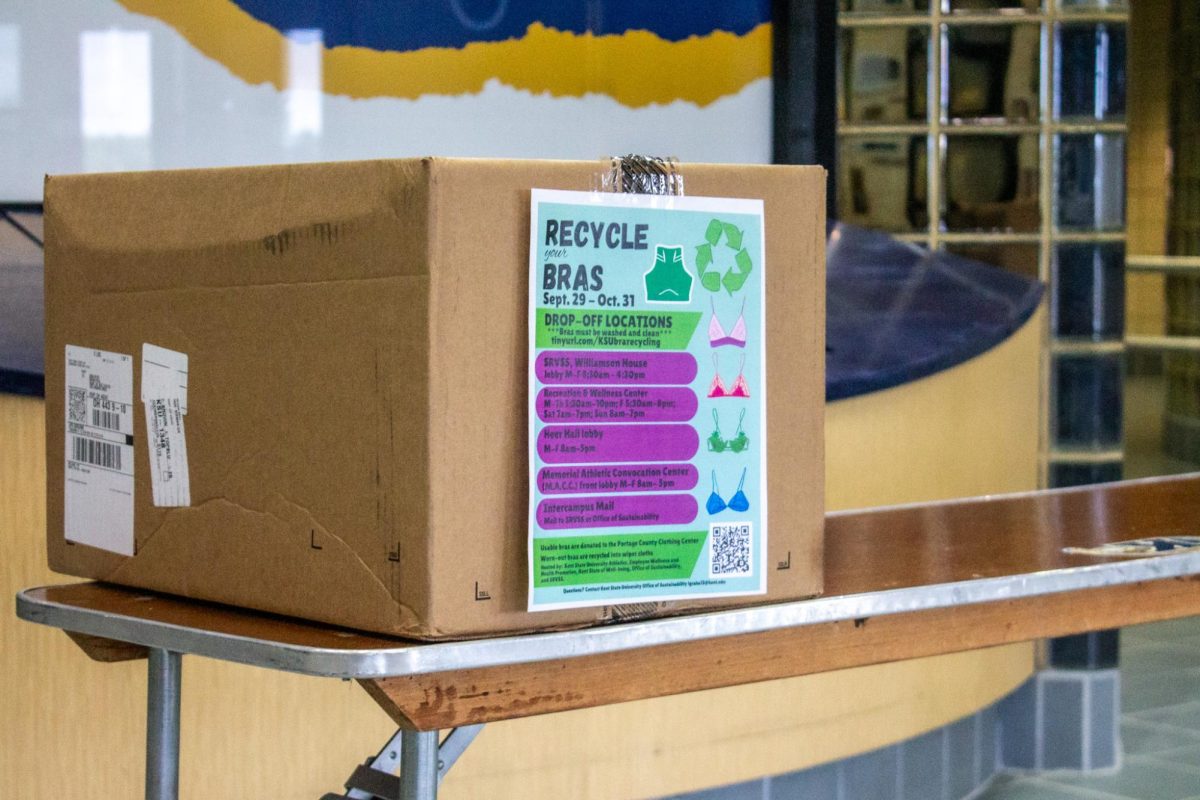This year marked the 13th annual Bra Recycling Drive. The drive was hosted by Kent State University’s Athletics, Employee Wellness and Health Promotion, Kent State of Well-being, the Office of Sustainability and the Center for Sexual Relationship Violence Support Services.
From Sept. 29 until Oct. 31, Kent students and employees can donate old or gently worn bras at the multiple dropoff locations. Donations will go to the Phyllis Zumkehr County Clothing Center in Ravenna, Ohio.
Donated worn-out bras, which must be washed in order to be donated, will also be recycled into wiper cloths by The Bra Recyclers, a clothing recycling social enterprise. The Bra Recyclers were founded by Elaine Birks-Mitchell and Johnny Mitchell, and they specialize in the reuse of pre-loved bras and underwear.
Madison Massey, coordinator of employee wellness and health promotion for the Division of People, Culture and Belonging, has worked with the drive for the three years she has been with Kent State.
“[Sustainability is] a big part of wellness, and I believe that people don’t really think about sustainability as a part of wellness,” she said.
Leah Graham, KSU’s sustainability coordinator, has been working with the drive since its start in fall 2013. Graham said the Office of Sustainability seeks out ways to involve students in the promotion of sustainability on campus.
The drive has been successful over the past 13 years and has helped Portage County overall.
“The student, faculty and staff participation are what have made it possible to collect over 2,500 bras,” she said. “About 70% are donated, and about 30% of bras have been recycled,” she said. “The Bra Recycling Drive provides an opportunity to make items available for free to Portage County community members that otherwise may have ended up in a landfill, and worn-out bras are sent for recycling.”
Meghan Factor-Page, associate director of Kent State of Well-being’s recreation and wellness services, talked about the drive’s assistance with helping the environment and people who can’t afford necessities like bras.
“Bras are often made with fabrics and materials that don’t easily break down in landfills. Recycling or repurposing them helps reduce textile waste and supports sustainability by keeping usable items in circulation,” Factor-Page said. “Donating bras in good shape ensures that individuals who may not have access to these essential items can receive them. This supports dignity, comfort and confidence, particularly for women and girls in need.”
Massey brought up the intersection of community wellbeing and sustainability that comes with the drive.
“A healthier planet promotes individual and community wellbeing,” Massey said. “Making conscious lifestyle choices supports both the person and the community.”
With October being National Breast Cancer Awareness Month, employees were also able to schedule on-site 3D mammograms through their insurance from Sept. 29 through Oct. 2, sponsored by Employee Wellness and Health Promotion. The on-site mammograms are also offered in April.
Factor-Page said the on-site mammograms being offered are important because they “remove barriers to preventive health care for faculty and staff.”
She said that people tend to delay mammograms for a multitude of reasons: cost, lack of transportation or busy schedules.
“Providing [mammograms] at a job site can increase the amount of people that take advantage of preventative wellness,” she said. “It also normalizes and reminds people to do it who may wish to get their mammogram somewhere else.”
Multiple drop-off locations are offered around campus, including the M.A.C. Center and the Student Recreation and Wellness Center.
Melora Shue is a reporter. Contact her at [email protected].


